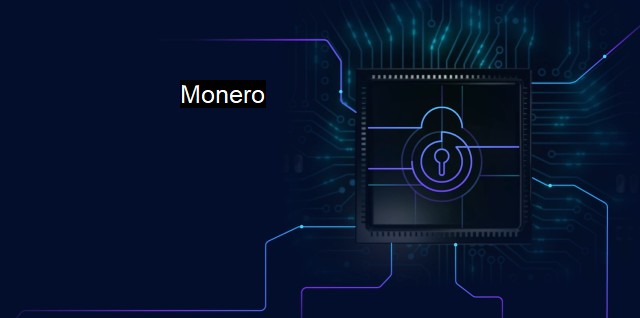What is Monero?
Monero: The Decentralized Cryptocurrency Championing Privacy and Security in the Age of Cyber Threats
Monero, launched in 2014, is a blockchain-based digital currency that was designed to provide an anonymous and confidential way to conduct transactions. The platform utilizes a unique underlying technology that has captured the attention of those seeking to maintain privacy on the blockchain, a feature not fully offered by many cryptocurrencies. When dealing with cybersecurity and antivirus, understanding Monero further helps discern links, overlaps and unique characteristics related to this technology.Monero (XMR), unlike other digital currencies, is a privacy-centric coin and is built upon the robust principles of decentralization, privacy, and resistance to censorship. Its blockchain, or digital ledger, is obfuscated, meaning the details of every transaction undertaken are hidden and can't be traced. This includes such details as identification of the blockchain participants, transaction value, or source of funds.
From a cybersecurity perspective, Monero’s key selling point – its strong emphasis on security and privacy – can be equally daunting. As it prevents transaction tracing, it has become a favorite among unscrupulous actors including hackers, malware developers, and threat actors seeking hard-to-trace digital currencies.
Although the importance of computer security is well-known, the presence of Monero has given antivirus systems a new and distinct challenge. Unfortunately, the obscurity and encryption of Monero have inspired the invention and deployment of a new generation of malware known as ‘cryptojacking’. Cybercriminals use cryptojacking to mine crytpocurrencies on other individuals' computers without their knowledge or consent. Simply clicking on a malicious link can result in the downloading and installation of mining software on a user's computer, which then skims a few cents or dollars at a time off to mine Monero.
Antivirus and cybersecurity measures are playing a vital role in identifying and counteracting such threats. websites employing cryptojacking scripts can be stopped through the use of comprehensive antivirus software; and individuals can use advanced firewall settings to suppress such script-reliant sites. Antivirus software providers are developing and incorporating functionality to detect crypto mining malware used to mine Monero and are employing heuristic methodologies, recognising and learning patterns of program activity related with rogue crypto mining.
Given its design to circumvent tracking, Monero as a tool can induce an adverse cybersecurity wave. with every emerging cryptocurrency, technology is bound to be hostilely employed by some agents. Similarly, it also presents a challenge which inspires enhancements, upgrades, and new mechanisms within cybersecurity and privacy technologies. It warrants the development and refinement of antivirus capabilities while perpetuating education and awareness protocols to mitigate risks adequately.
Implementation's of cybersecurity have multiplied in response to the threats that arise from the use of cryptocurrencies like Monero. Regular software updates, installation of reputed antivirus solutions, deploying hardware and software firewalls, securing Wi-Fi connections, spreading awareness about phishing techniques, and promoting secure browsing practices are some of the counter-measures advocated by cybersecurity practitioners globally.
The story of Monero, with strong privacy and security features, exposes the complexities that come with a highly encrypted world of digital currencies. It is a paradox whereby decryption tools serve to impede root causes of crypto-related cybercrimes, while simultaneously feeding into privacy vulnerabilities. Hence, the art of balancing utility and privacy-security becomes critical. Monero serves as a crucial reminder that as we progress with technological improvements, we cannot afford to overlook the careful management of their inherent threats and benefits.

Monero FAQs
What is Monero and how is it related to cybersecurity and antivirus?
Monero is a cryptocurrency that uses advanced privacy features to keep transactions untraceable and anonymous. It is often used in cybersecurity and antivirus contexts as a means of payment or as a way to secure online anonymity.Is Monero safe to use for online transactions?
Monero's privacy features make it a secure option for online transactions, as it is difficult to trace the sender or receiver of Monero funds. However, like any cryptocurrency, users should take precautions to ensure the safety and security of their Monero holdings.Can Monero be used to evade antivirus or other security measures?
Monero's anonymity features can make it difficult to identify the source of a potential threat, but it is not inherently designed to evade antivirus or other security measures. It is important to remember that Monero is a legitimate cryptocurrency that is used for a variety of purposes, and should not be automatically associated with malicious activity.How does Monero protect user privacy?
Monero uses a combination of ring signatures, stealth addresses, and confidential transactions to obscure the identifying details of its users and transactions. This makes it difficult to trace a Monero transaction back to its source or destination, ensuring that user privacy is protected.| | A | | | B | | | C | | | D | | | E | | | F | | | G | | | H | | | I | | | J | | | K | | | L | | | M | |
| | N | | | O | | | P | | | Q | | | R | | | S | | | T | | | U | | | V | | | W | | | X | | | Y | | | Z | |
| | 1 | | | 2 | | | 3 | | | 4 | | | 7 | | | 8 | | |||||||